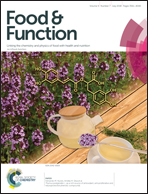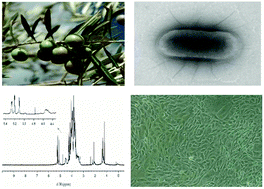
Zhu, Yanan, Gemma González-Ortiz, Rufino Jiménez-Díaz, Míriam Pérez-Trujillo, Teodor Parella, Paola López-Colom & Susana María Martín-Orúe. 2018. Exopolysaccharides from olive brines could reduce the adhesion of ETEC K88 to intestinal epithelial cells. Food & Function 9(7). 3884–3894. DOI: https://doi.org/10.1039/c8fo00690c
This study aims to explore the biological functions of the isolated exopolysaccharides (EPSs) produced during the industrial fermentation of olives against enterotoxigenic E. coli (ETEC) K88. Exopolysaccharides were isolated from five industrial fermenters. Analysis of their monosaccharide composition by GLC revealed that the main components were glucose (27%–50%) and galactose (23%–33%) followed by rhamnose (4–23%) and arabinose (6–17%). The 1H NMR spectrum showed a very similar profile between samples, and a more in-depth analysis revealed the presence of an α-pyranose in the form of α-D-Glcp-(1→) and two different α-furanoses, with chemicals shift values, suggesting the presence of α-D-Glcf and α-D-Galf. Miniaturized in vitro tests demonstrated the ability of EPS samples to attach specifically to ETEC K88 (P < 0.05) with variable intensities. The competition test did not show the ability to block the ETEC K88 adhesion to IPEC-J2 cells; however, in the displacement test, all EPS samples were shown to effectively remove the pathogens attached to the cells (P < 0.01).
These results suggest that the EPSs produced during the fermentation of table green olives could interfere with the attachment of opportunistic pathogens onto the intestinal epithelial cells. This would open the possibility of novel functional properties for this traditional Mediterranean fermented food and for the isolated EPSs as candidates for nutraceutics to be used in human and/or animal diets in the prevention and treatment of ETEC diarrhoea.
